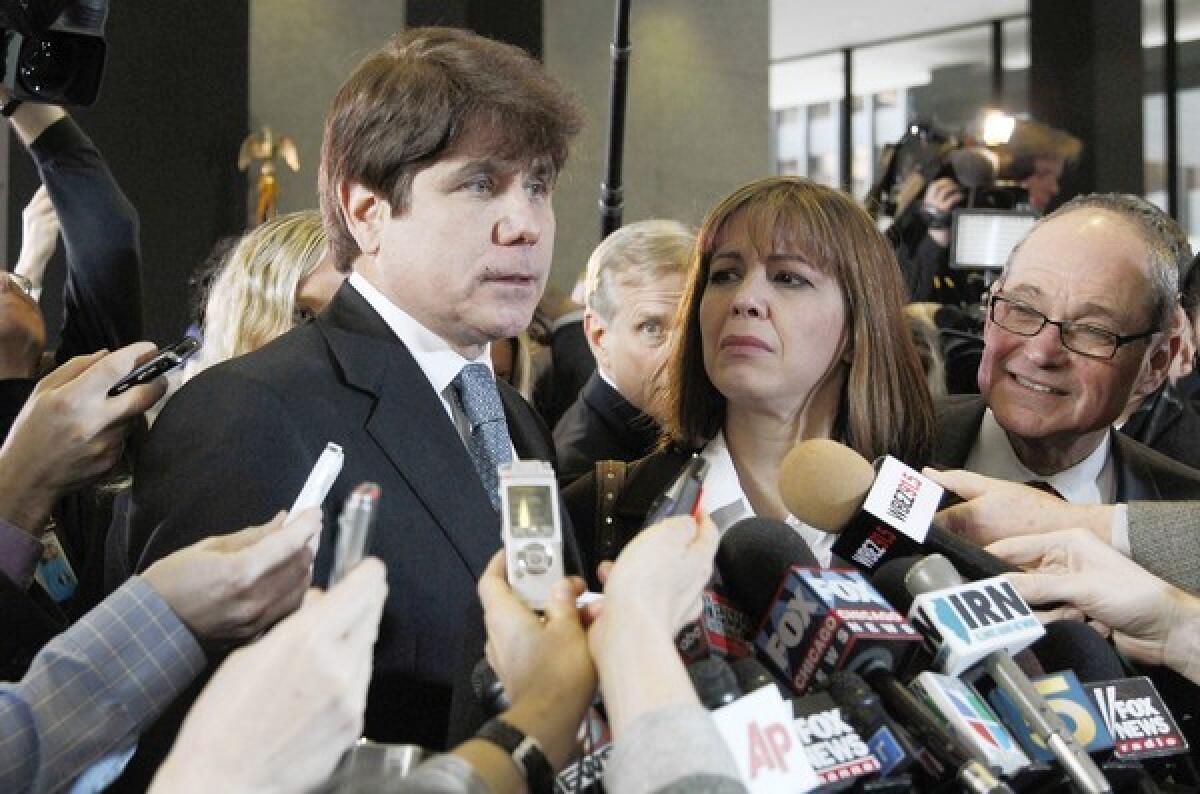Editorial: Once again, Trump showers his mercy on corrupt officials and white-collar criminals. Who’s next?

- Share via
Not for the first time, President Trump has perverted the presidential pardon power to benefit undeserving recipients with whom he shares a personal or political affinity. On Tuesday, the White House announced that Trump had commuted the prison sentence of former Illinois Gov. Rod Blagojevich, an epically corrupt politician who once appeared on Trump’s reality TV series “Celebrity Apprentice,” and granted a pardon to former New York City Police Commissioner Bernard B. Kerik, who was appointed to that post by then-Mayor Rudolph W. Giuliani, currently Trump’s personal lawyer.
Objectionable as these grants of clemency may be, they also raise concerns about what would be an even more outrageous abuse of the pardon power: clemency for convicted Trump associates such as Paul Manafort, Trump’s 2016 campaign chairman, and Roger Stone. On Tuesday, Trump again expressed sympathy for Stone, who faces sentencing Thursday in federal court for lying to Congress, witness tampering and obstructing a congressional investigation into Russian meddling in the 2016 election. (Trump asserted, however, that he hadn’t given any thought to a pardon for Stone.)
The Constitution gives the president essentially unbounded power “to grant reprieves and pardons for offenses against the United States, except in cases of impeachment.” But a principled president will exercise that power in the interests of mercy, not because the recipients of clemency are prominent or political bedfellows or well-connected or cronies of the president himself.
Trump, however, seems to see the pardon power as a way to reward supporters and score political points. The beneficiaries of his clemency have included former Arizona Sheriff Joe Arpaio, a hero of the anti-immigrant right who was absolved of a contempt-of-court conviction; conservative provocateur Dinesh D’Souza, who was pardoned after pleading guilty to violating campaign-finance laws; and, more recently, several members of the U.S. military, including three service members accused or convicted of war crimes.
Blagojevich was convicted in 2011 of several counts of corruption, including trying to sell the U.S. Senate seat vacated by Barack Obama after he won the presidency. He has served eight years of a 14-year sentence. In addition to the “Celebrity Apprentice” connection, Blagojevich was prosecuted by Patrick Fitzgerald, a friend of James B. Comey, who was fired as FBI director by Trump and who has become an obsession for the president. On Tuesday, Trump said that the case against Blagojevich was “a prosecution by the same people — Comey, Fitzpatrick — the same group.” (Comey wasn’t even in the Justice Department when Blagojevich was prosecuted.)
Trump made the point in his own defense that Blagojevich was a Democrat, and the White House noted that some prominent Democrats have supported cutting short Blagojevich’s sentence. But that doesn’t mean Trump’s action wasn’t improper for other reasons. As all five Republican House members warned the president last year in a joint statement: “Commuting the sentence of Rod Blagojevich, who has a clear and documented record of egregious corruption, sets a dangerous precedent and goes against the trust voters place in elected officials.”
Kerik was sentenced to four years in prison in 2010 after pleading guilty to tax fraud and making false statements. Among other actions, he admitted to speaking to city regulators on behalf of a contractor who had done renovations on his apartment for free. Kerik was released in 2013.
In granting clemency to Blagojevich and Kerik, Trump, who has spoken in lurid terms about street crime, seemed to be less bothered by crimes involving white-collar defendants and corrupt public officials. That same message is sent by his pardons of Edward J. DeBartolo Jr., a former owner of the San Francisco 49ers who pleaded guilty in 1998 to concealing an extortion attempt by former Louisiana Gov. Edwin Edwards, and junk-bond king Michael Milken.
Some of the grants of clemency issued by Trump on Tuesday are defensible, including commutations for two women convicted of drug offenses. But often when Trump extends clemency to a recipient, deserving or less so, he does so after the intervention of a celebrity. That was the case with Alice Marie Johnson, whose sentence for a nonviolent drug conviction was commuted after intervention by reality television star Kim Kardashian West. That hardly seems like justice.
Overall, Trump’s exercise of the pardon power has been at best whimsical and at worst self-serving and blatantly political. The president would be a committing an even worse corruption of the pardon power if he used it to annul the convictions of figures such as Manafort and Stone. Given Trump’s contempt for law enforcement and the judicial system, that is a real concern.
More to Read
A cure for the common opinion
Get thought-provoking perspectives with our weekly newsletter.
You may occasionally receive promotional content from the Los Angeles Times.










